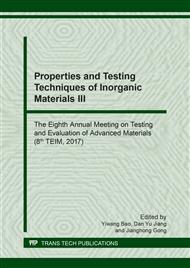p.286
p.293
p.306
p.314
p.320
p.326
p.331
p.336
p.341
Micromechanical Behavior and Micromorphology of Single PVA Fiber Pullout
Abstract:
To evaluate the suitability of domestic polyvinyl alcohol (PVA) fiber for preparing high ductility cementitious composites (HDCC), single PVA fiber pullout tests were conducted. The tests were carried out with four matrices having a water-to-cement ratio of 0.25 or 0.30, and fly ash replacement level 60% or 80%. The micromechanical behavior of single PVA fiber pullout from the matrix was monitored using a fiber tensile testing machine. Micromorphology of the pulled fiber was subsequently investigated using scanning electron microscopy (SEM). The results indicated that the slip-hardening coefficient is greater than zero and that the fiber therefore meets the micromechanical requirements for preparing HDCC. The chemical bonding energy and frictional bond strength were determined to decrease with the increasing fly ash content and/or water-to--cement ratio. SEM images indicate a significant number hydration products attached to the fiber surface, associated with an increase friction force during fiber pullout. After the pullout test, a complete tunnel containing fiber fragments was observed in the matrix, indicative of matrix cutting.
Info:
Periodical:
Pages:
331-335
DOI:
Citation:
Online since:
April 2018
Authors:
Keywords:
Price:
Сopyright:
© 2018 Trans Tech Publications Ltd. All Rights Reserved
Share:
Citation:


